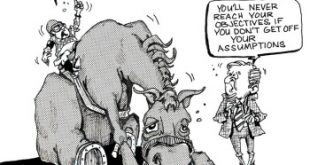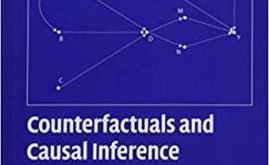Dirichlet’s principle — sophisticated simplicity [embedded content]
Read More »Keynes on the additivity fallacy
Keynes on the additivity fallacy The unpopularity of the principle of organic unities shows very clearly how great is the danger of the assumption of unproved additive formulas. The fallacy, of which ignorance of organic unity is a particular instance, may perhaps be mathematically represented thus: suppose f(x) is the goodness of x and f(y) is the goodness of y. It is then assumed that the goodness of x and y together is f(x) + f(y) when it is clearly f(x...
Read More »Econometrics — science based on questionable presumptions
Econometrics — science based on questionable presumptions What we are asked to assume is that the precept can be carried out in economics by techniques which are established for linear systems, serially independent disturbances, error-free observations, and samples of a size not generally obtainable in economic time series today. In view of such limitations, anyone using these techniques must find himself appealing at every stage less to what theory is...
Read More »The dangers of calling your pet cat a dog
The dangers of calling your pet cat a dog The assumption of additivity and linearity means that the outcome variable is, in reality, linearly related to any predictors … and that if you have several predictors then their combined effect is best described by adding their effects together … This assumption is the most important because if it is not true then even if all other assumptions are met, your model is invalid because you have described it...
Read More »The alleged success of econometrics
The alleged success of econometrics Econometricians typically hail the evolution of econometrics as a “big success”. For example, Geweke et al. (2006) argue that “econometrics has come a long way over a relatively short period” … Pagan (1987) describes econometrics as “outstanding success” because the work of econometric theorists has become “part of the process of economic investigation and the training of economists” … These claims represent no more than...
Read More »P-value — a poor substitute for scientific reasoning
P-value — a poor substitute for scientific reasoning [embedded content]All science entails human judgment, and using statistical models doesn’t relieve us of that necessity. Working with misspecified models, the scientific value of significance testing is actually zero — even though you’re making valid statistical inferences! Statistical models and concomitant significance tests are no substitutes for doing real science. In its standard form, a significance...
Read More »Golden ratio (student stuff)
Golden ratio (student stuff) [embedded content]
Read More »The rhetoric of imaginary populations
The rhetoric of imaginary populations The most expedient population and data generation model to adopt is one in which the population is regarded as a realization of an infinite super population. This setup is the standard perspective in mathematical statistics, in which random variables are assumed to exist with fixed moments for an uncountable and unspecified universe of events … This perspective is tantamount to assuming a population machine that spawns...
Read More »Econometric self-deceptions
One may wonder how much calibration adds to the knowledge of economic structures and the deep parameters involved … First, few ‘deep parameters’ have been established at all … Second, even where estimates are available from micro-econometric investigations, they cannot be automatically imported into aggregated general equilibrium models … Third, calibration hardly contributes to growth of knowledge about ‘deep parameters’. These deep parameters are confronted with a novel...
Read More »Randomization
[embedded content] A great video, but — there’s always a but — unfortunately also not without some analytical shortcomings. The point of making a randomized experiment is often said to be that it ‘ensures’ that any correlation between a supposed cause and effect indicates a causal relation. This is believed to hold since randomization (allegedly) ensures that a supposed causal variable does not correlate with other variables that may influence the effect. The problem with...
Read More » Heterodox
Heterodox







